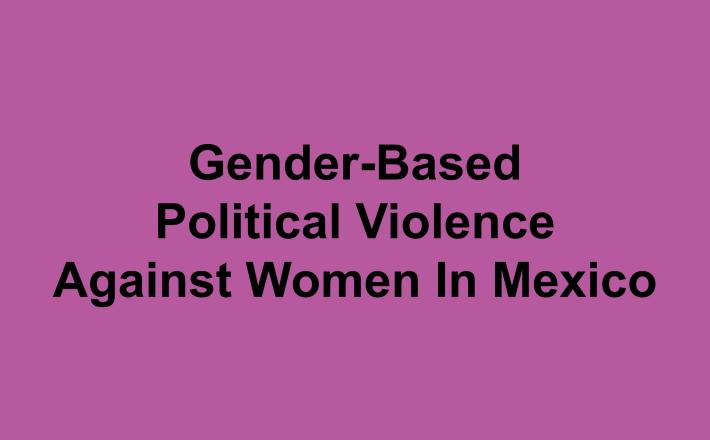Political violence in Mexico's 2024 elections: Gender-based political violence against women
Source: Wilson Center
Introduction
Over the last twenty years, the world has witnessed significant shifts towards greater gender equality in politics, which in turn has had positive implications for democracy and society at large.
Mexico has witnessed a systematic incorporation of gender perspective, equality, and parity in public life, signifying a transformation of women's ability to participate in the country's future. The prime example is the National Electoral Institute (INE) mandate, later ratified by the Electoral Tribunal (TEPJF), for political parties to guarantee gender parity in all upcoming gubernatorial elections of 2024: Chiapas, Guanajuato, Jalisco, Morelos, Puebla, Tabasco, Veracruz, Yucatán, and Mexico City.
Unfortunately, as women's participation in politics rises, an increase in political violence that explicitly targets women has also occurred. The 2020-2021 electoral process was the most violent against Mexican women.
Mexico´s political system is awash with political violence that explicitly targets and affects women, obstructs social justice, and hinders democracy. The advances in female political participation have been met with resistance as men, territorial interest groups, and political elites seemingly feel threatened by increasing female power and respond with violent actions to uphold the traditional system of politics to deter women’s independent participation.
Read here the full article published by the Wilson Center on 13 March 2024.
Image source: Wilson Center

Introduction
Over the last twenty years, the world has witnessed significant shifts towards greater gender equality in politics, which in turn has had positive implications for democracy and society at large.
Mexico has witnessed a systematic incorporation of gender perspective, equality, and parity in public life, signifying a transformation of women's ability to participate in the country's future. The prime example is the National Electoral Institute (INE) mandate, later ratified by the Electoral Tribunal (TEPJF), for political parties to guarantee gender parity in all upcoming gubernatorial elections of 2024: Chiapas, Guanajuato, Jalisco, Morelos, Puebla, Tabasco, Veracruz, Yucatán, and Mexico City.
Unfortunately, as women's participation in politics rises, an increase in political violence that explicitly targets women has also occurred. The 2020-2021 electoral process was the most violent against Mexican women.
Mexico´s political system is awash with political violence that explicitly targets and affects women, obstructs social justice, and hinders democracy. The advances in female political participation have been met with resistance as men, territorial interest groups, and political elites seemingly feel threatened by increasing female power and respond with violent actions to uphold the traditional system of politics to deter women’s independent participation.
Read here the full article published by the Wilson Center on 13 March 2024.
Image source: Wilson Center